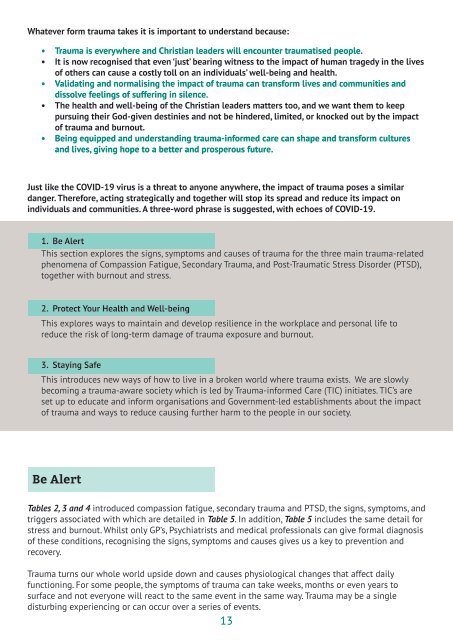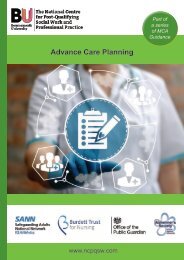Burnout in Churches and Christian Faith-Based Organisations
Burnout is a “syndrome of emotional exhaustion, depersonalization and reduced personal accomplishment that can occur among individuals who work with people in some capacity (Maslach 1996:193). This definition, whilst helpful, fails to convey the potentially life-shattering impact that burnout can have, as described in the words of ‘Peter’, a Christian leader who contributed to this guidance.
Burnout is a “syndrome of emotional exhaustion, depersonalization and reduced personal accomplishment that can occur among individuals who work with people in some capacity (Maslach 1996:193).
This definition, whilst helpful, fails to convey the potentially life-shattering impact that burnout can have, as described in the words of ‘Peter’, a Christian leader who contributed to this guidance.
You also want an ePaper? Increase the reach of your titles
YUMPU automatically turns print PDFs into web optimized ePapers that Google loves.
Whatever form trauma takes it is important to underst<strong>and</strong> because:<br />
• Trauma is everywhere <strong>and</strong> <strong>Christian</strong> leaders will encounter traumatised people.<br />
• It is now recognised that even ‘just’ bear<strong>in</strong>g witness to the impact of human tragedy <strong>in</strong> the lives<br />
of others can cause a costly toll on an <strong>in</strong>dividuals’ well-be<strong>in</strong>g <strong>and</strong> health.<br />
• Validat<strong>in</strong>g <strong>and</strong> normalis<strong>in</strong>g the impact of trauma can transform lives <strong>and</strong> communities <strong>and</strong><br />
dissolve feel<strong>in</strong>gs of suffer<strong>in</strong>g <strong>in</strong> silence.<br />
• The health <strong>and</strong> well-be<strong>in</strong>g of the <strong>Christian</strong> leaders matters too, <strong>and</strong> we want them to keep<br />
pursu<strong>in</strong>g their God-given dest<strong>in</strong>ies <strong>and</strong> not be h<strong>in</strong>dered, limited, or knocked out by the impact<br />
of trauma <strong>and</strong> burnout.<br />
• Be<strong>in</strong>g equipped <strong>and</strong> underst<strong>and</strong><strong>in</strong>g trauma-<strong>in</strong>formed care can shape <strong>and</strong> transform cultures<br />
<strong>and</strong> lives, giv<strong>in</strong>g hope to a better <strong>and</strong> prosperous future.<br />
Just like the COVID-19 virus is a threat to anyone anywhere, the impact of trauma poses a similar<br />
danger. Therefore, act<strong>in</strong>g strategically <strong>and</strong> together will stop its spread <strong>and</strong> reduce its impact on<br />
<strong>in</strong>dividuals <strong>and</strong> communities. A three-word phrase is suggested, with echoes of COVID-19.<br />
1. Be Alert<br />
This section explores the signs, symptoms <strong>and</strong> causes of trauma for the three ma<strong>in</strong> trauma-related<br />
phenomena of Compassion Fatigue, Secondary Trauma, <strong>and</strong> Post-Traumatic Stress Disorder (PTSD),<br />
together with burnout <strong>and</strong> stress.<br />
2. Protect Your Health <strong>and</strong> Well-be<strong>in</strong>g<br />
This explores ways to ma<strong>in</strong>ta<strong>in</strong> <strong>and</strong> develop resilience <strong>in</strong> the workplace <strong>and</strong> personal life to<br />
reduce the risk of long-term damage of trauma exposure <strong>and</strong> burnout.<br />
3. Stay<strong>in</strong>g Safe<br />
This <strong>in</strong>troduces new ways of how to live <strong>in</strong> a broken world where trauma exists. We are slowly<br />
becom<strong>in</strong>g a trauma-aware society which is led by Trauma-<strong>in</strong>formed Care (TIC) <strong>in</strong>itiates. TIC’s are<br />
set up to educate <strong>and</strong> <strong>in</strong>form organisations <strong>and</strong> Government-led establishments about the impact<br />
of trauma <strong>and</strong> ways to reduce caus<strong>in</strong>g further harm to the people <strong>in</strong> our society.<br />
Be Alert<br />
Tables 2, 3 <strong>and</strong> 4 <strong>in</strong>troduced compassion fatigue, secondary trauma <strong>and</strong> PTSD, the signs, symptoms, <strong>and</strong><br />
triggers associated with which are detailed <strong>in</strong> Table 5. In addition, Table 5 <strong>in</strong>cludes the same detail for<br />
stress <strong>and</strong> burnout. Whilst only GP’s, Psychiatrists <strong>and</strong> medical professionals can give formal diagnosis<br />
of these conditions, recognis<strong>in</strong>g the signs, symptoms <strong>and</strong> causes gives us a key to prevention <strong>and</strong><br />
recovery.<br />
Trauma turns our whole world upside down <strong>and</strong> causes physiological changes that affect daily<br />
function<strong>in</strong>g. For some people, the symptoms of trauma can take weeks, months or even years to<br />
surface <strong>and</strong> not everyone will react to the same event <strong>in</strong> the same way. Trauma may be a s<strong>in</strong>gle<br />
disturb<strong>in</strong>g experienc<strong>in</strong>g or can occur over a series of events.<br />
13



